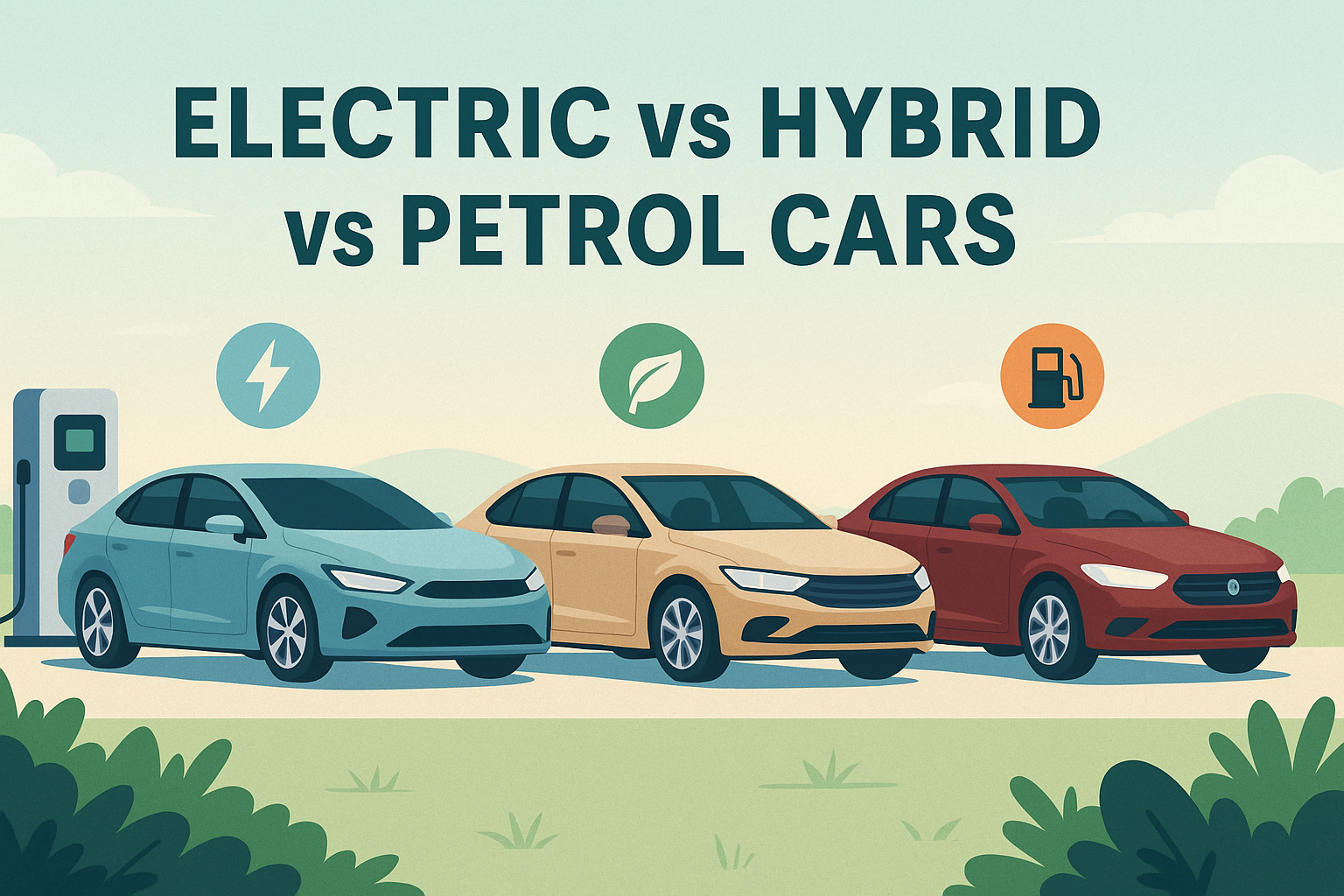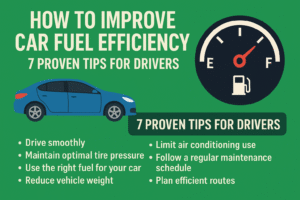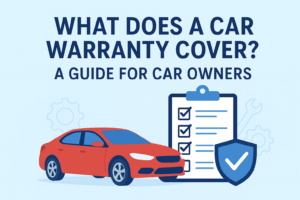Choosing the right car in 2025 is more complex than ever, with electric vs hybrid cars and traditional petrol cars each offering unique benefits. Whether you prioritize cost, performance, or environmental impact, understanding the differences between these powertrains is crucial for making an informed decision. This guide compares petrol vs hybrid vs electric cars, diving into costs, performance, maintenance, and more to help you find the best electric cars, hybrids, or petrol vehicles for your lifestyle.
With advancements in battery technology, hybrid efficiency, and fuel economy, the automotive industry is evolving rapidly. At BuyingCarAssist, we empower drivers with expert insights to navigate this decision. From our EV Savings Calculator to personalized consultations, we’re here to guide you. Ready to discover which car type is best for you? Let’s explore!
Confused about electric vs hybrid cars? Book a consultation with BuyingCarAssist to find your perfect match!
Understanding Electric, Hybrid, and Petrol Cars
What Are Petrol Cars?
Petrol cars, powered by internal combustion engines (ICE), run on gasoline. They’re the traditional choice, dominating roads for decades due to their reliability, widespread fuel availability, and established infrastructure.
- Pros:
- Affordable upfront costs (e.g., $10,000-$20,000 for compact models).
- Extensive refueling network (gas stations are nearly universal).
- Proven technology with robust performance for long drives.
- Cons:
- Higher fuel costs (global petrol prices: ~$1.2-$2/liter in 2025).
- Significant carbon emissions, contributing to air pollution.
- Regular maintenance (e.g., oil changes, spark plugs).
Example Models: Volkswagen Golf, Honda Civic, Toyota Corolla.
What Are Hybrid Cars?
Hybrid cars combine a petrol engine with an electric motor and battery, offering a balance of fuel efficiency and range. They come in two types:
- Full Hybrids: Can run on electric power alone for short distances (e.g., Toyota Prius).
- Plug-in Hybrids (PHEVs): Larger batteries, chargeable via outlets, with longer electric-only ranges (e.g., Volvo XC60 PHEV).
- Pros:
- Better fuel economy than petrol cars (e.g., 40-60 mpg vs. 25-35 mpg).
- Lower emissions than petrol cars.
- No reliance on charging infrastructure for full hybrids.
- Cons:
- Higher upfront costs ($15,000-$30,000).
- Complex systems increase maintenance costs.
- Limited electric-only range for full hybrids (1-5 miles).
Example Models: Toyota Camry Hybrid, Honda Accord Hybrid, Hyundai Ioniq.
What Are Electric Cars?
Electric cars (EVs) run entirely on battery power, with no combustion engine. They’re charged via home or public charging stations and are gaining popularity due to zero-emission operation and government incentives.
- Pros:
- Zero tailpipe emissions, ideal for eco-conscious drivers.
- Lower operating costs (e.g., $0.05-$0.15/mile vs. $0.10-$0.20/mile for petrol).
- Minimal maintenance (no oil changes, fewer moving parts).
- Cons:
- High upfront costs ($25,000-$50,000 for mainstream models).
- Limited charging infrastructure in some regions.
- Longer refueling time (30 minutes to hours vs. 5 minutes for petrol).
Example Models: Tesla Model 3, Nissan Leaf, Rivian R1T.
Want to explore EV savings? Try our EV Savings Calculator to see how much you can save!
Comparison: Electric vs Hybrid vs Petrol Cars
To help you decide, here’s a detailed comparison of electric vs hybrid vs petrol cars across key metrics.
Table: Electric vs Hybrid vs Petrol Cars
| Factor | Petrol Cars | Hybrid Cars | Electric Cars |
| Upfront Cost | $10,000-$20,000 (affordable) | $15,000-$30,000 (moderate) | $25,000-$50,000 (high) |
| Fuel Cost | $1,200-$2,000/year (high) | $600-$1,200/year (moderate) | $300-$600/year (low) |
| Maintenance Cost | $500-$1,000/year (moderate) | $400-$800/year (moderate) | $200-$400/year (low) |
| Range | 400-600 miles/tank | 500-700 miles (combined) | 200-400 miles/charge |
| Emissions | High (150-250 g CO2/km) | Moderate (80-120 g CO2/km) | Zero (tailpipe) |
| Charging/Fueling Time | 5 minutes (gas station) | 5 minutes (gas for full hybrids) | 30 min-8 hours (charger-dependent) |
| Performance | Good acceleration, noisy | Smooth, quieter than petrol | Instant torque, silent |
| Infrastructure | Universal (gas stations) | Universal (gas stations) | Growing but limited (charging stations) |
Note: Costs and ranges vary by model and region. Data reflects 2025 global averages.
Key Factors to Consider
Purchase Cost
- Petrol Cars: Most affordable, with compact models like the Honda Civic starting at $12,000. Ideal for budget-conscious buyers.
- Hybrid Cars: Moderately priced, with models like the Toyota Prius at $25,000. Plug-in hybrids (e.g., Mitsubishi Outlander PHEV) cost more ($30,000+).
- Electric Cars: Highest upfront costs, with mainstream EVs like the Tesla Model 3 at $35,000. Incentives (e.g., tax credits) can offset costs in some regions.
Best for: Petrol cars suit tight budgets, hybrids offer a middle ground, and EVs appeal to those with higher budgets and eco-goals.
Fuel and Operating Costs
- Petrol Cars: High fuel costs ($1.2-$2/liter) make them expensive for daily commuters (e.g., $1,500/year for 15,000 miles at 25 mpg).
- Hybrid Cars: Save 30-50% on fuel due to electric motor assistance (e.g., $800/year for 15,000 miles at 50 mpg).
- Electric Cars: Lowest operating costs, with electricity costing $0.05-$0.15/mile. Home charging further reduces expenses.
Pro Tip: Use our EV Savings Calculator to compare long-term costs for your driving habits.
Maintenance Costs
- Petrol Cars: Require regular maintenance (oil changes, spark plugs, exhaust systems), costing $500-$1,000/year.
- Hybrid Cars: Similar maintenance to petrol cars but slightly lower due to less engine wear ($400-$800/year). Battery replacement (after 8-10 years) can cost $2,000-$5,000.
- Electric Cars: Minimal maintenance (no oil, fewer moving parts), costing $200-$400/year. Battery longevity (10-15 years) reduces long-term costs.
Learn more maintenance tips in our Ultimate Car Care Guide to keep costs low!
Performance and Driving Experience
- Petrol Cars: Reliable for long drives, with good acceleration but noisier engines. Ideal for highways and rural areas.
- Hybrid Cars: Smooth and quiet, with electric motors aiding low-speed driving. Plug-in hybrids offer electric-only modes for city use.
- Electric Cars: Instant torque delivers thrilling acceleration (e.g., Tesla Model 3 hits 0-60 mph in 3.1 seconds). Silent operation enhances comfort.
Best for: EVs for performance enthusiasts, hybrids for balanced city/highway driving, petrol for traditionalists.
Environmental Impact
- Petrol Cars: High emissions (150-250 g CO2/km) contribute to air pollution and climate change.
- Hybrid Cars: Lower emissions (80-120 g CO2/km) make them greener than petrol but less eco-friendly than EVs.
- Electric Cars: Zero tailpipe emissions, though electricity source (e.g., coal vs. renewable) affects overall impact.
Best for: EVs for eco-conscious drivers, hybrids for those transitioning to greener options.
Infrastructure and Accessibility
- Petrol Cars: Gas stations are ubiquitous, making refueling quick and easy (5 minutes).
- Hybrid Cars: Rely on gas stations for full hybrids, with plug-in hybrids needing occasional charging (home or public stations).
- Electric Cars: Charging infrastructure is expanding (e.g., Tesla Superchargers, ChargePoint), but availability varies. Home charging (Level 1/2) takes 4-8 hours, fast chargers 30-60 minutes.
Best for: Petrol and hybrids for areas with limited charging, EVs for urban areas with chargers.
Best Electric Cars in 2025
The best electric cars in 2025 combine range, performance, and value. Here are top picks:
- Tesla Model 3 ($35,000)
- Range: 350 miles
- Features: Autopilot, 15-inch touchscreen, 0-60 mph in 3.1 seconds.
- Best for: Performance and tech enthusiasts.
- Nissan Leaf Plus ($32,000)
- Range: 226 miles
- Features: Affordable, reliable, compact design.
- Best for: Budget-conscious urban drivers.
- Rivian R1T ($70,000)
- Range: 400 miles
- Features: Off-road capability, premium interior, 0-60 mph in 3 seconds.
- Best for: Adventure seekers.
- Ford Mustang Mach-E ($45,000)
- Range: 300 miles
- Features: Sporty design, spacious interior, fast charging.
- Best for: Families and performance lovers.
- Volkswagen ID.4 ($40,000)
- Range: 280 miles
- Features: Affordable, practical, good resale value.
- Best for: Everyday commuters.
Curious about EV savings? Use our EV Savings Calculator to see if an electric car fits your budget!
Best Hybrid Cars in 2025
Hybrid cars offer a balance of efficiency and range. Top models include:
- Toyota Prius ($28,000)
- Fuel Economy: 58 mpg
- Features: Reliable, spacious, low emissions.
- Best for: City commuters.
- Honda Accord Hybrid ($32,000)
- Fuel Economy: 48 mpg
- Features: Premium interior, smooth ride.
- Best for: Families and long drives.
- Hyundai Ioniq Plug-in Hybrid ($30,000)
- Fuel Economy: 52 mpg, 30-mile electric range
- Features: Affordable, modern tech.
- Best for: Urban drivers with charging access.
- Volvo XC60 PHEV ($55,000)
- Fuel Economy: 28 mpg, 35-mile electric range
- Features: Luxury, safety features.
- Best for: Premium buyers.
- Lexus ES Hybrid ($42,000)
- Fuel Economy: 44 mpg
- Features: Quiet ride, upscale design.
- Best for: Comfort seekers.
Best Petrol Cars in 2025
Petrol cars remain popular for their affordability and range. Top picks include:
- Toyota Corolla ($22,000)
- Fuel Economy: 32 mpg
- Features: Reliable, affordable parts, good resale.
- Best for: Budget buyers.
- Honda Civic ($24,000)
- Fuel Economy: 36 mpg
- Features: Sporty design, fun to drive.
- Best for: Young drivers.
- Volkswagen Golf ($26,000)
- Fuel Economy: 34 mpg
- Features: Premium feel, versatile.
- Best for: Urban commuters.
- Mazda3 ($25,000)
- Fuel Economy: 33 mpg
- Features: Stylish, responsive handling.
- Best for: Performance enthusiasts.
- Subaru Impreza ($23,000)
- Fuel Economy: 31 mpg
- Features: All-wheel drive, rugged.
- Best for: Outdoor adventurers.
How to Choose the Right Car for You
Choosing between electric vs hybrid vs petrol cars depends on your priorities:
- Budget: Petrol cars are cheapest upfront, followed by hybrids. EVs have higher initial costs but lower long-term expenses.
- Driving Habits: EVs suit short urban commutes (50-100 miles/day) with charging access. Hybrids are ideal for mixed city/highway driving. Petrol cars excel for long drives or areas with limited chargers.
- Environmental Goals: EVs are best for zero emissions, followed by hybrids. Petrol cars are least eco-friendly.
- Performance Needs: EVs offer instant torque, hybrids provide smooth rides, and petrol cars deliver reliable power.
- Infrastructure Access: Petrol and hybrids need gas stations, while EVs require charging stations or home setups.
Steps to Decide:
- Assess Your Budget: Use our Car Affordability Calculator to estimate total costs, including purchase, fuel, and maintenance.
- Evaluate Driving Needs: Consider daily mileage, trip frequency, and access to charging or gas stations.
- Test Drive: Experience the performance of EVs, hybrids, and petrol cars to compare comfort and handling.
- Consult Experts: Our Car Consultation Services provide personalized advice to match your needs.
Need help choosing? Book a consultation with BuyingCarAssist to find the best car for you!
How BuyingCarAssist Can Help
At BuyingCarAssist, we simplify the car-buying process with expert guidance and tools. Our Ultimate Car Care Guide offers maintenance tips for all car types, while our consultations (starting at $25) help you compare electric vs hybrid vs petrol cars. We analyze your budget, driving habits, and preferences to recommend the best option.
Why Choose BuyingCarAssist?
- Expert Insights: Our team of engineers and car experts ensures informed decisions.
- Cost-Saving Tools: Use our EV Savings Calculator to compare long-term costs.
- Global Reach: Trusted by customers in the US, UK, UAE, and beyond.
Ready to find your ideal car? Book a consultation with BuyingCarAssist today!
Frequently Asked Questions
Q: What’s the main difference between electric, hybrid, and petrol cars?
A: Petrol cars use gasoline engines, hybrids combine petrol and electric power, and EVs run solely on batteries. Learn more in our Ultimate Car Care Guide.
Q: Which car type is cheapest to run?
A: EVs have the lowest operating costs ($300-$600/year), followed by hybrids ($600-$1,200). Petrol cars cost $1,200-$2,000/year. Use our EV Savings Calculator for details.
Q: Are electric cars worth the high upfront cost?
A: Yes, for urban drivers with charging access, EVs save on fuel and maintenance long-term. Compare costs with our Car Affordability Calculator.
Q: Which is better for long drives: petrol, hybrid, or electric?
A: Petrol and hybrids are better for long drives due to quick refueling and longer ranges. EVs suit shorter trips unless fast chargers are available.
Q: How do I choose between electric, hybrid, and petrol cars?
A: Consider budget, driving habits, and environmental goals. Our Car Consultation Services offer personalized recommendations.
Conclusion
Choosing between electric vs hybrid vs petrol cars depends on your budget, driving needs, and values. Electric cars lead in eco-friendliness and low operating costs, hybrids balance efficiency and range, and petrol cars offer affordability and convenience. With the best electric cars like the Tesla Model 3, hybrids like the Toyota Prius, and petrol models like the Honda Civic, there’s an option for every driver. BuyingCarAssist simplifies this decision with expert consultations and tools like our EV Savings Calculator.
Don’t know where to start? Book a consultation with BuyingCarAssist to find the perfect car for your lifestyle!







